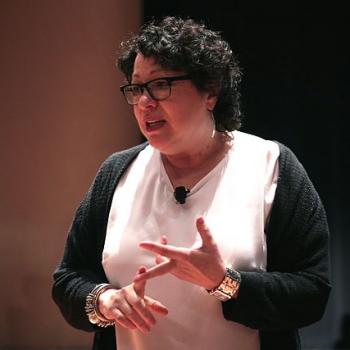Last night (in my opinion) ended badly.
This morning started badly. I had to do what millions of parents who were not in favor of a Trump presidency were doing: Break the news to my kids. It did not go over well.
We get small pockets of time with our children to explain tough things, times when they are open to hearing us and absorbing our words. You look for those times and dive in when you see it. Quickly enough, the window closes.
I dove into the window with my daughter this morning, hugging her tight and murmuring what I hoped were comforting words that acknowledged her feelings, conveyed strength and covered her in God’s love. Maybe I was successful, maybe I wasn’t. I had but a few minutes to do so before the window closed and the morning’s rush took over.
We spoke again this evening after she came home (and after I had quietly placed calls to her school’s counselor to please keep an eye on her, on all the kids and be sensitive to what some may be feeling and to teasing others may be doing). Thank God another window opened up and I dove in so that we could have a conversation touching upon a myriad of difficult topics: Feelings of sadness and ickiness, good vs. bad, choices, hope, democracy, fear, strength, faith in humanity, faith in our allies, faith in ourselves and above all faith in God.
Many parents are wondering how to have these tough discussions. Teachers, mentors, older brothers and sisters, grandparents – we all are wondering. Here are some good articles and resources I’ve quickly come across that I’d like to share with you:
From Huffington Post: What do we tell the children?
Tell them, first, that we will protect them. Tell them that we have democratic processes in the U.S. that make it impossible for one mean person to do too much damage. Tell them that we will protect those democratic processes ― and we will use them ― so that Trump is unable to act on many of the false promises he made during his campaign.
Tell them, second, that you will honor the outcome of the election, but that you will fight bigotry. Tell them bigotry is not a democratic value, and that it will not be tolerated at your school. Tell them you stand by your Muslim families. Your same-sex parent families. Your gay students. Your Black families. Your female students. Your Mexican families. Your disabled students. Your immigrant families. Your trans students. Your Native students. Tell them you won’t let anyone hurt them or deport them or threaten them without having to contend with you first. Say that you will stand united as a school community, and that you will protect one another. Say that silence is dangerous, and teach them how to speak up when something is wrong. Then teach them how to speak up, how to love one another, how to understand each other, how to solve conflicts, how to live with diverse and sometimes conflicting ideologies, and give them the skills to enter a world that doesn’t know how to do this.
From the Family and Youth Institute:
It is important that we begin by listening to our children before jumping into troubleshooting mode or trying to solve what we perceive to be their concerns. First understand what is going on in your child’s mind, what are they actually worried about, and what are their immediate concerns. You do not want to elevate your child’s anxiety by responding to a different concern than the one they are expressing. If you have multiple children at different developmental stages, it might be good to talk at the youngest’s level as a family and then speak individually with the older children. …
As parents, we need to model strength in identity and faith. Be proud of your faith identity and convey this message to your children. Research shows that children whose parents transmit information, values and perspectives about their cultural and religious heritage, which includes having a discussion about obstacles they may face because of the group they belong to, are less negatively affected by discrimination. These discussions should be developmentally appropriate depending on your child’s age. For younger children this may include messages of pride while for older children the discussion may also include talk about possible discrimination they face in school and greater society.
And from Patheos Muslim and Altmuslim contributor (and my friend) Afeefa Sayeed:
Parents – let’s be strong for our children and hold it together for them.
We have to look for the allies, for those who are positive and supportive of all communities. We must teach our children skills of continuous empathy, self-advocacy, peace building and help them understand American institutions and protections in place.
We will create space for students to share their feelings and age appropriately address these. We will continue to use our school’s core values of stewardship, intentionality, community, peace, good manners, and beneficial knowledge as the basis for all that we do. Because with strong charactered and activist learners we will have the strong and activist community we need to be.
Please limit their exposure to alarmist conversations and negative emotions…you can make a difference in their lives by taking this amana /trust more seriously than ever. But take time for self-care and reflection to build this strength for yourself.
اللهم لا تسلط علينا من لا يرحمنا
Oh Allah, do not appoint over us those who do not have mercy upon us
Parents must show confidence in Allah – don’t be nervous about the unknown. >Don’t ever assume evil, assume Khayr (goodness) – from Quranic perspective.
Worries stem from 3 things:
1. Something from the past – Rasullullah ﷺ said don’t ever say “what if?” Because opens doors of doubt and works of shaytaan.
2. The present: Allah wants us to look into ourselves and not the means / tools (asbaab). Need to focus solely on Allah.
3. Worried about the future: People need to be optimistic. When Prophet Muhammad (s) was digging the ditch, in Madinah, Muslims thought they were doomed. But he struck a rock and through the sparks saw hope and goodness. Practical aspect: we have been building relationships for a reason with interfaith communities. Many people still don’t know who we are and this election proved that. Don’t go back to your cocoon.>Pass strength and confidence to children.
Finally- Abu Sufyan used psychological war against Rasul ﷺ. He said he was going to crush the Muslims. Rasul ﷺ looked to his Companions and they responded: Hasbun Allah wa nimal Wakeel (Allah is sufficient for us and He is the best to take care of our affairs). When they said this they went back with no harm coming to them. They (mushrikeen) tried to scare them with someone other than Allah and Allah took care of them.
Continue to reach out. Don’t deny anyone. Bring goodness to the world. Do not accept any intimidation and bullying. Our rights need to be protected and we cannot be hiding.
May Allah give this community strength. Ameen.
Our family has faced many challenges, challenges that seemed to swallow us whole and bury us in foxholes from which we emerged bloodied and bruised. But we emerged. If you’ve been a follower of this blog, you know our family’s and our eldest son’s path is one of autism living — a living filled with such heartaches and such joys. And through that, the mantra I’ve adopted is this:
It’s going to be ok. It has to be.













